介词加关系代词引导定语从句
“介词+关系代词”引导的定语从句
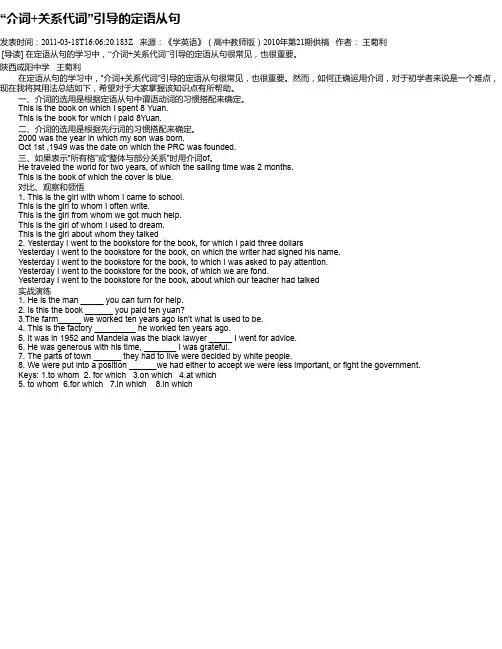
“介词+关系代词”引导的定语从句发表时间:2011-03-18T16:06:20.183Z 来源:《学英语》(高中教师版)2010年第21期供稿作者:王菊利[导读] 在定语从句的学习中,“介词+关系代词”引导的定语从句很常见,也很重要。
陕西咸阳中学王菊利在定语从句的学习中,“介词+关系代词”引导的定语从句很常见,也很重要。
然而,如何正确运用介词,对于初学者来说是一个难点,现在我将其用法总结如下,希望对于大家掌握该知识点有所帮助。
一、介词的选用是根据定语从句中谓语动词的习惯搭配来确定。
This is the book on which I spent 8 Yuan.This is the book for which I paid 8Yuan.二、介词的选用是根据先行词的习惯搭配来确定。
2000 was the year in which my son was born. Oct 1st ,1949 was the date on which the PRC was founded.三、如果表示“所有格”或“整体与部分关系”时用介词of。
He traveled the world for two years, of which the sailing time was 2 months. This is the book of which the cover is blue.对比、观察和领悟1. This is the girl with whom I came to school. This is the girl to whom I often write.This is the girl from whom we got much help. This is the girl of whom I used to dream.This is the girl about whom they talked2. Yesterday I went to the bookstore for the book, for which I paid three dollars Yesterday I went to the bookstore for the book, on which the writer had signed his name. Yesterday I went to the bookstore for the book, to which I was asked to pay attention. Yesterday I went to the bookstore for the book, of which we are fond. Yesterday I went to the bookstore for the book, about which our teacher had talked 实战演练1. He is the man _____ you can turn for help.2. Is this the book ______ you paid ten yuan?3.The farm_____ we worked ten years ago isn’t what is used to be.4. This is the factory _________ he worked ten years ago.5. It was in 1952 and Mandela was the black lawyer _____ I went for advice.6. He was generous with his time, _______ I was grateful.7. The parts of town ______ they had to live were decided by white people.8. We were put into a position ______we had either to accept we were less important, or fight the government. Keys: 1.to whom 2. for which 3.on which 4.at which 5. to whom 6.for which 7.in which 8.in which。
介词加关系代词引导的定语从句
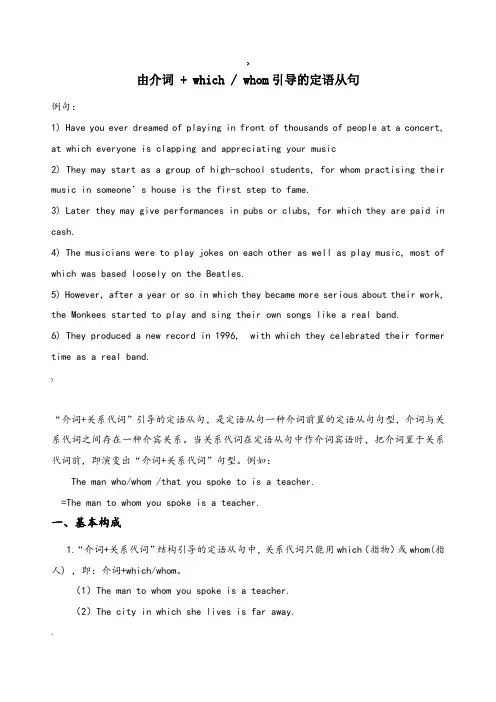
>由介词 + which / whom引导的定语从句例句:1) Have you ever dreamed of playing in front of thousands of people at a concert, at which everyone is clapping and appreciating your music2) They may start as a group of high-school students, for whom practising their music in someone’s house is the first step to fame.3) Later they may give performances in pubs or clubs, for which they are paid in cash.4) The musicians were to play jokes on each other as well as play music, most of which was based loosely on the Beatles.5) However, after a year or so in which they became more serious about their work, the Monkees started to play and sing their own songs like a real band.6) They produced a new record in 1996, with which they celebrated their former time as a real band.}“介词+关系代词”引导的定语从句,是定语从句一种介词前置的定语从句句型,介词与关系代词之间存在一种介宾关系。
高中英语引导定语从句-介词+关系代词结构归纳
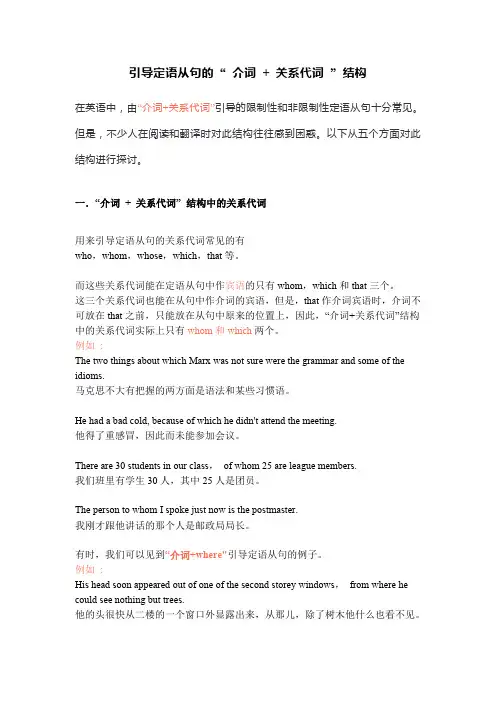
引导定语从句的“ 介词+ 关系代词” 结构在英语中,由“介词+关系代词”引导的限制性和非限制性定语从句十分常见。
但是,不少人在阅读和翻译时对此结构往往感到困惑。
以下从五个方面对此结构进行探讨。
一.“介词+ 关系代词” 结构中的关系代词用来引导定语从句的关系代词常见的有who,whom,whose,which,that等。
而这些关系代词能在定语从句中作宾语的只有whom,which和that三个。
这三个关系代词也能在从句中作介词的宾语,但是,that作介词宾语时,介词不可放在that之前,只能放在从句中原来的位置上,因此,“介词+关系代词”结构中的关系代词实际上只有whom和which两个。
例如:The two things about which Marx was not sure were the grammar and some of the idioms.马克思不大有把握的两方面是语法和某些习惯语。
He had a bad cold, because of which he didn't attend the meeting.他得了重感冒,因此而未能参加会议。
There are 30 students in our class,of whom 25 are league members.我们班里有学生30人,其中25人是团员。
The person to whom I spoke just now is the postmaster.我刚才跟他讲话的那个人是邮政局局长。
有时,我们可以见到“介词+where"引导定语从句的例子。
例如:His head soon appeared out of one of the second storey windows,from where he could see nothing but trees.他的头很快从二楼的一个窗口外显露出来,从那儿,除了树木他什么也看不见。
介词加关系代词引导的定语从句.
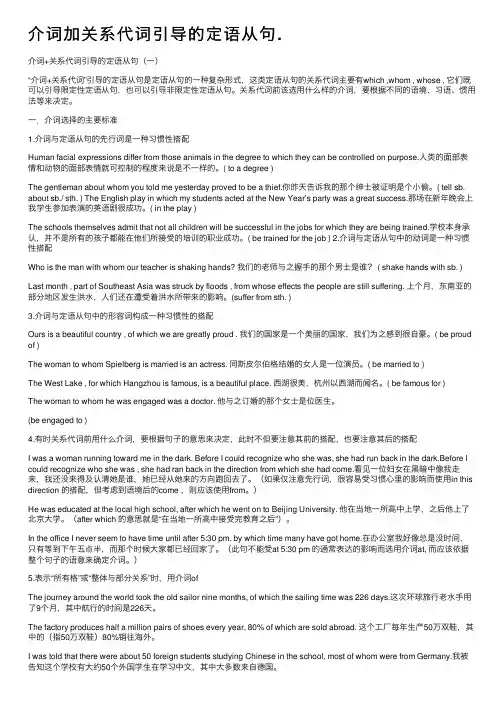
介词加关系代词引导的定语从句.介词+关系代词引导的定语从句(⼀)“介词+关系代词”引导的定语从句是定语从句的⼀种复杂形式,这类定语从句的关系代词主要有which ,whom , whose , 它们既可以引导限定性定语从句,也可以引导⾮限定性定语从句。
关系代词前该选⽤什么样的介词,要根据不同的语境、习语、惯⽤法等来决定。
⼀.介词选择的主要标准1.介词与定语从句的先⾏词是⼀种习惯性搭配Human facial expressions differ from those animals in the degree to which they can be controlled on purpose.⼈类的⾯部表情和动物的⾯部表情就可控制的程度来说是不⼀样的。
( to a degree )The gentleman about whom you told me yesterday proved to be a thief.你昨天告诉我的那个绅⼠被证明是个⼩偷。
( tell sb. about sb./ sth. ) The English play in which my students acted at the New Year’s party was a great success.那场在新年晚会上我学⽣参加表演的英语剧很成功。
( in the play )The schools themselves admit that not all children will be successful in the jobs for which they are being trained.学校本⾝承认,并不是所有的孩⼦都能在他们所接受的培训的职业成功。
( be trained for the job ) 2.介词与定语从句中的动词是⼀种习惯性搭配Who is the man with whom our teacher is shaking hands? 我们的⽼师与之握⼿的那个男⼠是谁? ( shake hands with sb. ) Last month , part of Southeast Asia was struck by floods , from whose effects the people are still suffering. 上个⽉,东南亚的部分地区发⽣洪⽔,⼈们还在遭受着洪⽔所带来的影响。
高中英语语法:介词加关系代词引导的定语从句
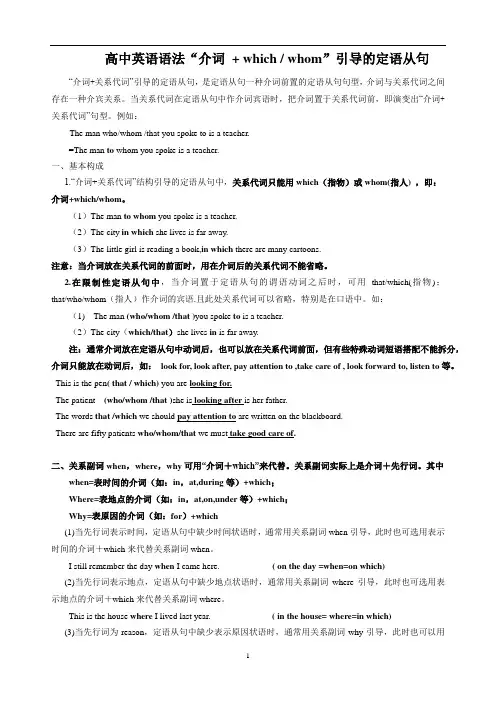
高中英语语法“介词+ which / whom”引导的定语从句“介词+关系代词”引导的定语从句,是定语从句一种介词前置的定语从句句型,介词与关系代词之间存在一种介宾关系。
当关系代词在定语从句中作介词宾语时,把介词置于关系代词前,即演变出“介词+关系代词”句型。
例如:The man who/whom /that you spoke to is a teacher.=The man to whom you spoke is a teacher.一、基本构成1.“介词+关系代词”结构引导的定语从句中,关系代词只能用which(指物)或whom(指人) ,即:介词+which/whom。
(1)The man to whom you spoke is a teacher.(2)The city in which she lives is far away.(3)The little girl is reading a book,in which there are many cartoons.注意:当介词放在关系代词的前面时,用在介词后的关系代词不能省略。
2.在限制性定语从句中,当介词置于定语从句的谓语动词之后时,可用that/which(指物);that/who/whom(指人)作介词的宾语.且此处关系代词可以省略,特别是在口语中。
如:(1) The man (who/whom /that )you spoke to is a teacher.(2)The city(which/that)she lives in is far away.注:通常介词放在定语从句中动词后,也可以放在关系代词前面,但有些特殊动词短语搭配不能拆分,介词只能放在动词后,如:look for, look after, pay attention to ,take care of , look forward to, listen to等。
介词+关系代词引导的定语从句例句
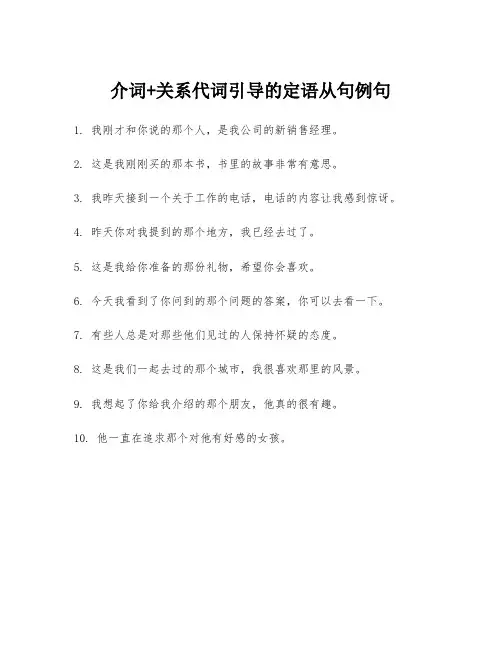
介词+关系代词引导的定语从句例句
1. 我刚才和你说的那个人,是我公司的新销售经理。
2. 这是我刚刚买的那本书,书里的故事非常有意思。
3. 我昨天接到一个关于工作的电话,电话的内容让我感到惊讶。
4. 昨天你对我提到的那个地方,我已经去过了。
5. 这是我给你准备的那份礼物,希望你会喜欢。
6. 今天我看到了你问到的那个问题的答案,你可以去看一下。
7. 有些人总是对那些他们见过的人保持怀疑的态度。
8. 这是我们一起去过的那个城市,我很喜欢那里的风景。
9. 我想起了你给我介绍的那个朋友,他真的很有趣。
10. 他一直在追求那个对他有好感的女孩。
高中英语引导定语从句-介词+关系代词结构归纳
引导定语从句的“ 介词+ 关系代词” 结构在英语中,由“介词+关系代词”引导的限制性和非限制性定语从句十分常见。
但是,不少人在阅读和翻译时对此结构往往感到困惑。
以下从五个方面对此结构进行探讨。
一.“介词+ 关系代词” 结构中的关系代词用来引导定语从句的关系代词常见的有who,whom,whose,which,that等。
而这些关系代词能在定语从句中作宾语的只有whom,which和that三个。
这三个关系代词也能在从句中作介词的宾语,但是,that作介词宾语时,介词不可放在that之前,只能放在从句中原来的位置上,因此,“介词+关系代词”结构中的关系代词实际上只有whom和which两个。
例如:The two things about which Marx was not sure were the grammar and some of the idioms.马克思不大有把握的两方面是语法和某些习惯语。
He had a bad cold, because of which he didn't attend the meeting.他得了重感冒,因此而未能参加会议。
There are 30 students in our class,of whom 25 are league members.我们班里有学生30人,其中25人是团员。
The person to whom I spoke just now is the postmaster.我刚才跟他讲话的那个人是邮政局局长。
有时,我们可以见到“介词+where"引导定语从句的例子。
例如:,from where he His head soon appeared out of one of the second storey windowscould see nothing but trees.他的头很快从二楼的一个窗口外显露出来,从那儿,除了树木他什么也看不见。
介词加关系代词引导的定语从句
介词+关系代词引导的定语从句(一)“介词+关系代词”引导的定语从句是定语从句的一种复杂形式,这类定语从句的关系代词主要有which ,whom , whose , 它们既可以引导限定性定语从句,也可以引导非限定性定语从句。
关系代词前该选用什么样的介词,要根据不同的语境、习语、惯用法等来决定。
一.介词选择的主要标准1.介词与定语从句的先行词是一种习惯性搭配Human facial expressions differ from those animals in the degree to which they can be controlled on purpose.人类的面部表情和动物的面部表情就可控制的程度来说是不一样的。
( to a degree )The gentleman about whom you told me yesterday proved to be a thief.你昨天告诉我的那个绅士被证明是个小偷。
( tell sb. about sb./ sth. ) The English play in which my students acted at the New Year’s party was a great success.那场在新年晚会上我学生参加表演的英语剧很成功。
( in the play )The schools themselves admit that not all children will be successful in the jobs for which they are being trained.学校本身承认,并不是所有的孩子都能在他们所接受的培训的职业成功。
( be trained for the job ) 2.介词与定语从句中的动词是一种习惯性搭配Who is the man with whom our teacher is shaking hands? 我们的老师与之握手的那个男士是谁? ( shake hands with sb. )Last month , part of Southeast Asia was struck by floods , from whose effects the people are still suffering. 上个月,东南亚的部分地区发生洪水,人们还在遭受着洪水所带来的影响。
介词关系代词引导的定语从句
定语从句之—介词+关系代词词The Attributive Clause关系代词的用法;在复合句中修饰一个名词或代词的从句称为定语从句,一般紧跟在它所修饰的名词或代词后面。
定语从句所修饰的名词或代词称为先行词。
引导定语从句的关联词称为关系词,关系词有关系代词和关系副词。
关系代词有that ,which ,who ,whom ,whose 。
考查重点定语从句定语从句是中考必考考点之一,主要考查的是时态及宾语从句的语序,有时也会考查定语从句的引导词。
考查的主要形式是单项填空、完形填空、短文填空和完成句子。
阅读理解和书面表达肯定也会考查到定语从句。
因此学生要熟练掌握定语从句的用法。
关系代词引导的定语从句最为常见和常考。
命题趋势引导定语从句的关系词有关系代词和关系副词,关系代词和关系副词放在先行词及定语从句之间起连接作用,同时又作定语从句的重要成分。
常见的关系代词包括that, which, who(宾格whom,所有格whose)等关系副词包括where, when, why等根据定语从句与先行词的关系,定语从句可分为限制性定语从句及非限制性定语从句。
限制性定语从句:紧跟先行词,主句与从句不用逗号分开,从句不可省去。
非限制性定语从句:主句与从句之间有逗号分开,起补充说明作用,如省去,意思仍完整。
关系代词:who、that、whom、whose、which 做作主主语做宾语语1)指人:who/that 指物:which/that 2)指人:who/whom/that/省略指物:which/that/省略► The man who/tha t spoke at the ► The building which/that is ► I visited a scientist whose name is known all over themeeting is from Hong Kong.会上发言的人来自香港。
“介词 + 关系代词”引导的定语从句
“介词 + 关系代词”引导的定语从句“介词+关系代词”型定语从句五大考点“介词+关系代词”引导的定语从句是英语语法中的难点和重点, 近年来高考对这一语法结构的考查大有升温之势。
在介词后作宾语的关系代词只有which 和whom。
如先行词是物,引导词用which;如先行词是人,则引导词用whom。
如:This is the ship by which I went to Shanghai.This is the student for whom I bought the book.考点1 简单介词+关系代词知识归纳:用于此结构的关系代词指人时只能用whom, 指物时只能用which;介词选择的依据主要是根据从句中的动词、形容词、名词与介词的固定搭配而定;或者以先行词与从句中的动词关系及所表达的含义而定;或者以先行词在定语从句中的作用和含义而定,并且含有介词的短语动词不能拆开,介词仍然放在动词之后。
(1)根据定语从句中的谓语动词确定介词,其动词或介词搭配,构成动词短语。
例如:Is this the car for which you paid a high price? (pay for)In the dark street, there wasn’t a single person to whom she could turn for help. (turn to sb for help)The man with whom you shook hands just now is our English teacher. (shake hands with sb) (2)根据定语从句中的形容词确定介词,其形容词与介词搭配,构成形容词短语。
例如:The two things about which Karl Marx was not sure were the grammar and some of the idioms. (be sure about)The teacher of whom the students in our class are fond is Mr Wang, our English teacher. (be fond of)(3)根据定语从句所修饰的先行词确定介词,其先行词往往是表示时间、地点、原因、方法、工具等的词,它们与介词之间有一定的联系。
- 1、下载文档前请自行甄别文档内容的完整性,平台不提供额外的编辑、内容补充、找答案等附加服务。
- 2、"仅部分预览"的文档,不可在线预览部分如存在完整性等问题,可反馈申请退款(可完整预览的文档不适用该条件!)。
- 3、如文档侵犯您的权益,请联系客服反馈,我们会尽快为您处理(人工客服工作时间:9:00-18:30)。
“介词+关系代词”引导的定语从句是定语从句的一种复杂形式,这类定语从句的关系代词主要有which ,whom , whose ,它们既可以引导限定性定语从句,也可以引导非限定性定语从句。
关系代词前该选用什么样的介词,要根据不同的语境、习语、惯用法等来决定。
一.介词选择的主要标准1.介词与定语从句的先行词是一种习惯性搭配Human facial expressions differ from those animals in the degreetowhichthey can be controlled on purpose.人类的面部表情和动物的面部表情就可控制的程度来说是不一样的。
( to a degree )Thegentlemanaboutwhomyoutoldmeyesterdayprovedtobeathief.你昨天告诉我的那个绅士被证明是个小偷。
( tell sb. about sb./sth. )TheEnglishplayi nwhichmystudentsactedattheNewYear’sparty was a great success.那场在新年晚会上我学生参加表演的英语剧很成功。
( in the play )Theschoolsthemselvesadmitthatnotallchildrenwillbesuccessful in the jobsforwhichthey are being trained.学校本身承认,并不是所有的孩子都能在他们所接受的培训的职业成功。
( be trainedfor the job )2.介词与定语从句中的动词是一种习惯性搭配Who is the manwith whomour teacher is shaking hands?我们的老师与之握手的那个男士是谁?( shake hands with sb. )Last month , part of Southeast Asia was struck by floods ,from3.介词与定语从句中的形容词构成一种习惯性的搭配Ours is a beautiful country ,of whichwe are greatly proud .我们的国家是一个美丽的国家,我们为之感到很自豪。
( be proud of )The womanto whomSpielberg is married is an actress.同斯皮尔伯格结婚的女人是一位演员。
( be married to )The West Lake ,for whichHangzhou is famous, is a beautiful place.西湖很美,杭州以西湖而闻名。
( be famous for )The womanto whomhe was engaged was a doctor.他与之订婚的那个女士是位医生。
(be engaged to )4.有时关系代词前用什么介词,要根据句子的意思来决定,此时不但要注意其前的搭配,也要注意其后的搭配I was a woman running toward me in the dark. Before I couldrecognize who she was, she had run back in the dark.Before I couldrecognize who she was , she had ran back in the directionfromwhichshe had come.看见一位妇女在黑暗中像我走来,我还没来得及认清她是谁,她已经从她来的方向跑回去了。
(如果仅注意先行词,很容易受习惯心里的影响而使用in this direction的搭配,但考虑到语境后的come,则应该使用from。
)He was educated at the local high school,after whichhe went on toBeijingUniversity.他在当地一所高中上学,之后他上了北京大学。
(after which的意思就是“在当地一所高中接受完教育之后”)。
In the office I never seem to have time until after 5:30 pm.by表达的影响而选用介词at,而应该依据整个句子的语意来确定介词。
)5.表示“所有格”或“整体与部分关系”时,用介词ofThe journey around the world took the old sailor nine months,ofwhichthe sailing time was 226 days.这次环球旅行老水手用了9个月,其中航行的时间是226天。
The factory produces half a million pairs of shoes every year, 80%of which are sold abroad.这个工厂每年生产50万双鞋,其中的(指50万双鞋)80%销往海外。
I was told that there were about 50 foreign students studyingChinese in the school, mostof whomwere from Germany.我被告知这个学校有大约50个外国学生在学习中文,其中大多数来自德国。
I have many friends,of whomsome are businessmen.我有很多朋友,其中有些是生意人。
二.介词不能提前的情况当关系代词在定语从句中作介词的宾语时,介词可以提前放在which(指事物不能用that)或者whom(指人不能用who)之前,也可放于原来的位置,但在含有介词的动词固定短语中,由于动词和介词的关系比较紧密,一般不能将介词与动词拆开而将介词提到关系代词之前。
这类短语动词有listento/lookat/dependon/takecareof/lookinto/breakinto/getridof/lookforward to等。
Thisistheroomwhich/thatLuXunusedtolivein.(=Thisistheroomin whichLu Xun used to live.)这是鲁迅曾经住过的房间。
The man1) Have you ever dreamed of playing in front of thousands of peopleataconcert,atwhicheveryoneisclappingandappreciatingyourmusic?2)Theymaystartasagroupofhigh-schoolstudents,forwhompractising their music in someone’s house is the first step to fame.3) Later they may give performances in pubs or clubs, for which theyare paid in cash.4)Themusiciansweretoplayjokesoneachotheraswellasplaymusic, most of which was based loosely on the Beatles.5)However,afterayearorsoinwhichtheybecamemoreseriousabouttheirwork,the Monkeesstartedtoplayandsingtheirownsongs like a real band.6) Theyproduced a new record in 1996, with which theycelebratedtheir former time as a real band.“介词+关系代词”引导的定语从句,是定语从句一种介词前置的定语从句句型,介词与关系代词之间存在一种介宾关系。
当关系代词在定语从句中作介词宾语时,把介词置于关系代词前,即演变出“介词+关系代词”句型。
例如:The man who/whom /that you spoke to is a teacher.=The man to whom you spoke is a teacher.一、基本构成1.“介词+关系代词”结构引导的定语从句中,关系代词只能用which(指物)或whom(指人),即:介词+which/whom。
(1)The man to whom you spoke is a teacher.cartoons.注意:当介词放在关系代词的前面时,用在介词后的关系代词不能省略。
2.关系副词when,where,why可用“介词+which”来代替。
关系副词实际上是介词+先行词。
其中when=表时间的介词(如:in,at,on,during等)+which;Where=表地点的介词(如:in,at,on,under等)+which;Why=表原因的介词(如:for)+which(1)当先行词表示时间,定语从句中缺少时间状语时,通常用关系副词when 引导,此时也可选用表示时间的介词+which来代替关系副词when。
I still remember the day when I came here. ( on theday =when)(2)当先行词表示地点,定语从句中缺少地点状语时,通常用关系副词where引导,此时也可选用表示地点的介词+which来代替关系副词where。
This is the house where I lived last year. ( inthe house= where)(3)当先行词为reason,定语从句中缺少表示原因状语时,通常用关系副词why引导,此时也可以用for which来代替关系副词why。
There are many reasons why people like traveling. (for thereasons =why注意:1.含有介词的短语动词一般不拆开,介词仍放在短语动词的后面。
如: lookfor, look after, take care of,pay attention to, look forward to等。
most, each, few等代词或者数词,表示先行词的一部分或全部。
He loves his parents deeply, both of whom are very kind to him.In the baskettherearequitemany apples,some of which havegonebad.二.介词的选择根据从句中动词与先行词的逻辑关系。
